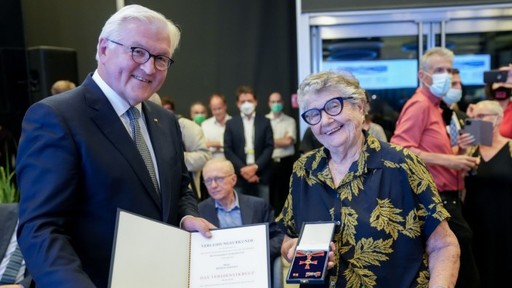On Iran and a farewell tour – Jonathan Lis in Haaretz:
‘German President Frank-Walter Steinmeier is due to arrive in Jerusalem Wednesday on a farewell tribute visit to outgoing Israeli President Reuven Rivlin, whose term ends on July 9. In response to questions submitted to the German head of state by Haaretz in advance of his visit, Steinmeier strongly opposed the pending war crimes investigation against Israel at the International Criminal Court in The Hague. And despite the German president’s support over the years for concluding a nuclear agreement with Iran, Steinmeier said Israel’s concerns regarding Iran are justified. On a more personal note, he recalled a conversation that he once had with Rivlin at a restaurant at the Mahane Yehuda market in Jerusalem about soccer.’
(…)
‘Serving as Germany’s foreign minister, you played a key role in advancing the nuclear deal with Iran. In recent days, a new extremist Iranian president has been elected, and the regime has not signaled its willingness to withdraw from its nuclear weapons program. Israel expresses strong opposition to a return to an agreement with Iran. In retrospect, and given the fact that Iran has not withdrawn from its plans, was the concern in Israel justified? Should the U.S. re-join the agreement?
"Israel’s concerns about the threat posed by an Iran aspiring to nuclear arms are of course justified. I have been constantly aware of these concerns throughout many years of difficult negotiations with Iran. And I have had numerous discussions with Israel on this issue, most recently with President Rivlin and Israel’s Chief of the General Staff in Berlin a few weeks ago. When it comes to Iran, Germany and Israel share a common strategic goal: Iran must not acquire nuclear weapons. We also want to restrict Iran’s missile program and its destabilizing activities in the region. We may not always agree on the best way to achieve this. However, we believe that renewing the JCPOA [the international nuclear agreementwith Iran] is the most effective way to demonstrably and verifiably prevent Iran from acquiring a nuclear bomb. Intensive and highly complex negotiations to this end involving the new U.S. administration are currently under way. I hope they are successful, for Germany’s and Israel’s sake."’
(…)
‘Your visit is taking place weeks after a new government has been formed in Israel. Do you expect the new government to promote a peace initiative with the Palestinian Authority? "My visit had already been planned long ago, and had to be postponed several times due to the pandemic. Now it coincides with the beginning of a new political chapter for Israel. I am very much looking forward to gaining a first impression of the new political situation in Israel. When I meet with Prime Minister Bennett and Foreign Minister Lapid, aside from German-Israeli issues, we will of course also discuss the Israeli-Palestinian conflict. The dramatic escalation of violence in May has no doubt made it painfully clear to all concerned that this conflict is not going to disappear, and cannot be ignored. And although this observation is by no means a new one, there can be no bright future without a political solution. The German government continues to regard a negotiated two-state solution as the most promising route to a peaceful future. But for the moment, I believe it is important to build trust between the new Israeli leadership and the Palestinian side. The resumption of direct dialogue on the big questions is a goal that can only be reached by small steps and concrete collaboration."’
Read the article here.
What is most remarkable about this interview is that almost everything that is being said (give or take a few details) could have been said in 2012 or 2014.
A frozen status quo.
Al least from the point of view of the German president, which is not meant as criticism. All other options might be worse. The repetition of well-meant phrases in the absence of any political solution.
